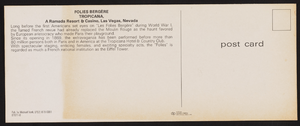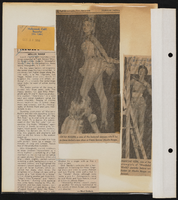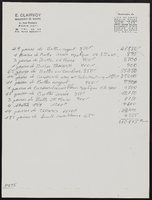Search the Special Collections and Archives Portal
Search Results

Transcript of interview with Betty Bunch by Joyce Marshall, January 9, 1996, February 7, 1996, & February 13, 2002
Date
Archival Collection
Description
Betty [Rosenthal] Bunch began dancing as a child. By the time she was nine years old she decided she would have a dancing career. At 18 years she began to work in stock theatre productions. Within a short time, she had joined the Moro-Landis dancers. She landed her first job in Las Vegas in 1956 at the Sahara Hotel as part of the opening line for Donald O'Connor. Following the Sahara, she worked as a dancer at the Riveria, and then returned to the Moulin Rouge in Hollywood. In 1961 while vacationing in Las Vegas, she landed a job dancing at the Dunes. She continued to dance, sing and do comedy until after the birth of her second child. At that time, she retired from the Las Vegas showroom, but not from show business. Her involvement in both film and stage has remained rich and varied. This interview focuses on the time Betty spent performing on the Las Vegas strip, including her long involvement with the acclaimed afternoon show Bottoms Up. The interview provides information on workin
Text
Paris, France Show Programs Collection
Identifier
Abstract
The Paris, France Show Programs Collection (1950-2000) is comprised of publicity print materials of the following cabaret music halls and burlesque clubs in Paris, France: Alcazar de Paris, Casino de Paris, Folies-Bergère, Le Lido de Paris, and Moulin Rouge Paris. The collection includes programs, advertising posters, fliers, long playing record albums, photograph slides, and restaurant menus. This material was formerly known as the International Show Programs Collection.
Archival Collection

Transcript of interview with Jerry Engel by Barbara Tabach, March 1, 2016
Date
Archival Collection
Description
Jerry Engel was born in 1930 in New Jersey and spent most of his early life in Long Beach, New York until the family moved westward to Las Angeles. Jerry is a retired Certified Public Accountant and loves to talk about the history of Las Vegas that he observed since arriving in 1953. That was the year that he moved to Las Vegas to join his older brothers, Morris and Phil, in their accounting firm. Their major client at the time was Desert Inn. Another personal connection with local history: the Engel brothers? mother, Esther Katz Engel, was among the early investors in the Moulin Rouge hotel/casino enterprise. Jerry graduated with honors from University of California, Los Angeles in 1951. His accounting career in Las Vegas is highly regarded and he continues to maintain a consulting practice. He remains active within the community and enjoys doing presentations based on his memories of Las Vegas history. Within this interview, Jerry highlights people, casinos and other observations of local history that he came into contact with over the decades. He provides insights about the role of an accountant in the gaming industry. He also discusses the influence of Jewish business leaders in and array of local gaming and non-gaming issues, including the retail world, Jim Crow era segregation, and the astonishing growth of the valley over six decades.
Text


Transcript of interview with William H. Bailey by Betty Rosenthal, March 16, 1978
Date
Archival Collection
Description
Interview with William H. Bailey conducted by Betty Rosenthal on March 16, 1978. Arriving in Las Vegas in 1955, Bailey became an assistant producer and master of ceremonies in the first interracial hotel in Nevada, the Moulin Rouge, and subsequently worked in radio and television. Bailey reflects on the history of discrimination in Las Vegas and its impact on the entertainment industry. Bailey's wife Anna was the first black girl dancer on the Strip in the 1961 production, "Nymphs of the Nile." Appointed by Governor Grant Sawyer to the Nevada State Equal Rights Investigatory Commission in 1961, Bailey served as its chairman and traveled throughout the state holding hearings. He describes his work on the commission and how discrimination in housing personally affected him.
Text





